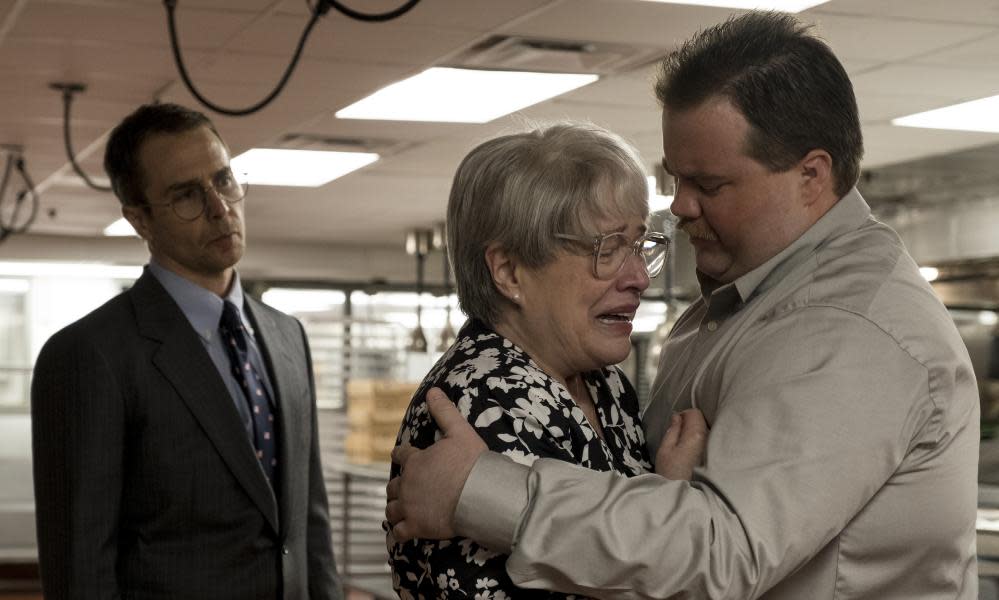Richard Jewell review – Clint Eastwood's bomb-hero drama fails to detonate

Clint Eastwood’s latest film is a miscarriage-of-justice tale taken from real life, a parable about the evils of “big government” that plays like a weird mashup of Paul Blart: Mall Cop with a bit of Marty, the 1955 Ernest Borgnine film about a sweet, unattractive guy who lives with his mother. It’s got a couple of great performances – and a lot of ropey acting from actors playing crass and mendacious caricatures.
During the 1996 Olympic games in Atlanta, an extreme-right terrorist named Eric Rudolph planted a pipe bomb at the city’s Centennial Park that killed one person and injured many; he was not caught until 2003. The fact that the casualties were not higher is down to the unassuming heroism of one man: private security guard Richard Jewell, a nerdy, overweight guy who lived with his mom, yearned to be a real cop and was an officious stickler for protocol – he spotted the rogue unattended backpack overlooked by those regular cops that Richard idolised, and began to herd the crowds away.
But the FBI decided that Richard fitted the profile of a sociopath who deliberately plants bombs to play the hero by finding them. Without hard evidence for an arrest, they leaked their suspicions to the city’s paper, turning up the media heat under Richard, hoping that he would just crack and confess. But, in his bewildered way, Richard stayed strong during his ordeal and the media and the feds wound up being thoroughly shamed. It’s the same narrative template as Eastwood’s Sully: regular guy does something heroic and is then pilloried by legalistic pointy heads, beta males and non-heroes.
This is the fascinating case that screenwriter Billy Ray and Eastwood want to revive for us, and in many ways, it is a very good story, efficiently told – and that’s down to the excellent and very plausible performance from Paul Walter Hauser. He is the heartbreakingly sad guy who is in many ways a de-ironised, de-caricatured version of the criminal conspiracist he played in I, Tonya. Kathy Bates is also quietly outstanding as his long-suffering mother, the Mary to Richard’s overweight, moustachioed, snack-chomping Messiah. Sam Rockwell plays Watson Bryant: the time-honoured role of the cantankerous, shambolic lawyer who takes up the underdog cause. He’s a real figure, too, although many more lawyers worked on this case.
Watson is (apparently) something of a maverick with a poster in his office reading, “I fear Government more than I fear terrorism”, although we never hear from Watson whether he precisely believes that, or if this case has changed his mind. In the background of many press conference scenes, incidentally, the confederate flag is unselfconsciously displayed alongside the star-spangled banner. In Georgia in 1996, there was a less of charge attached to this.
But there is much silliness in this film. Without any evidence whatsoever – and the film is about the culpability of acting without evidence – the movie asserts that the real-life journalist Kathy Scruggs (vampishly and absurdly played by Olivia Wilde) has sex with sources to get her story. This means sleeping with FBI man Tom Shaw, a fictional composite of the actual officers, and this dull, shrill, square-jawed role points up Jon Hamm’s weaknesses as an actor. He needs some sympathy and comedy for his handsomeness to work, and it doesn’t work here. As for the real Scruggs, she’s dead and can’t sue. It’s as if Eastwood and Ray can’t just let it go at a press misstep. She has to be slut-shamed as well.
But Hauser is the star and he keeps the film on track: poignant, lonely and vulnerable – maintaining the tricky balance of laugh-at and laugh-with. His Jewell is a mysterious figure, the victim-hero who really did save lives but was deprived of his moment of glory and yearned only to be an authority figure, while all around him authority figures were proving themselves to be malign and incompetent.
• Richard Jewell is released in the UK on 31 January and in Australia on 13 February.

 Yahoo Movies
Yahoo Movies 
